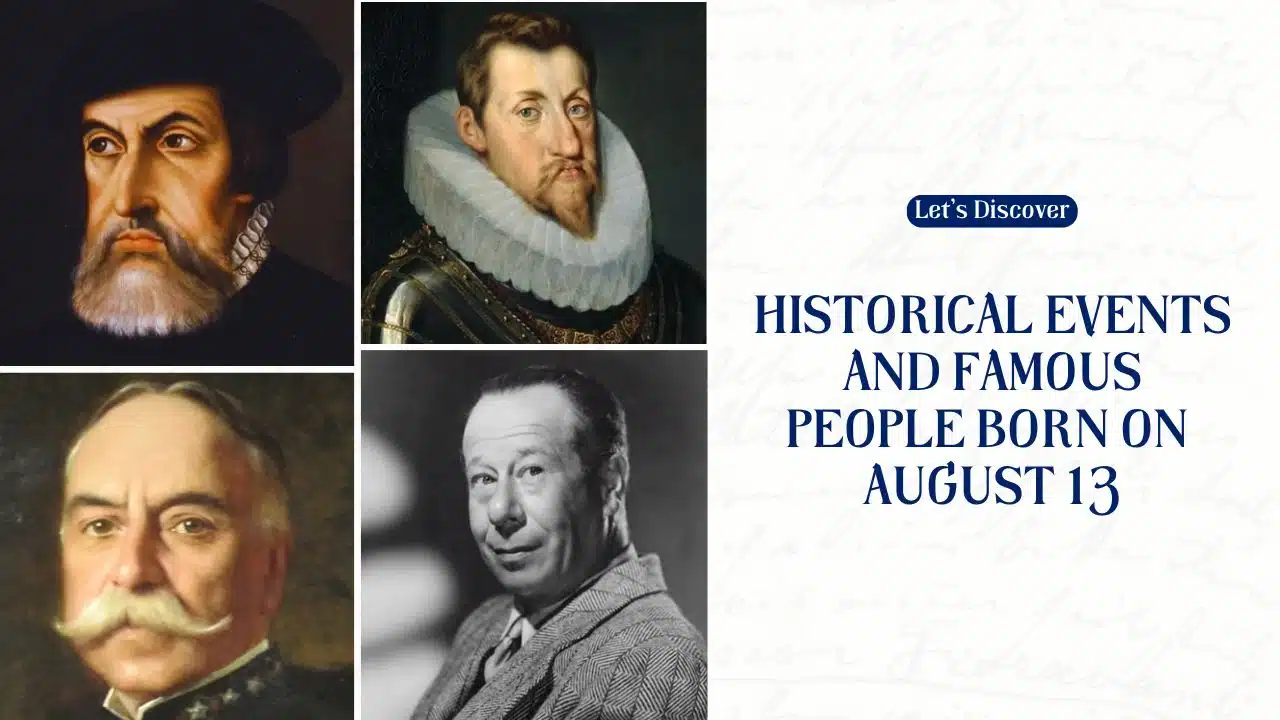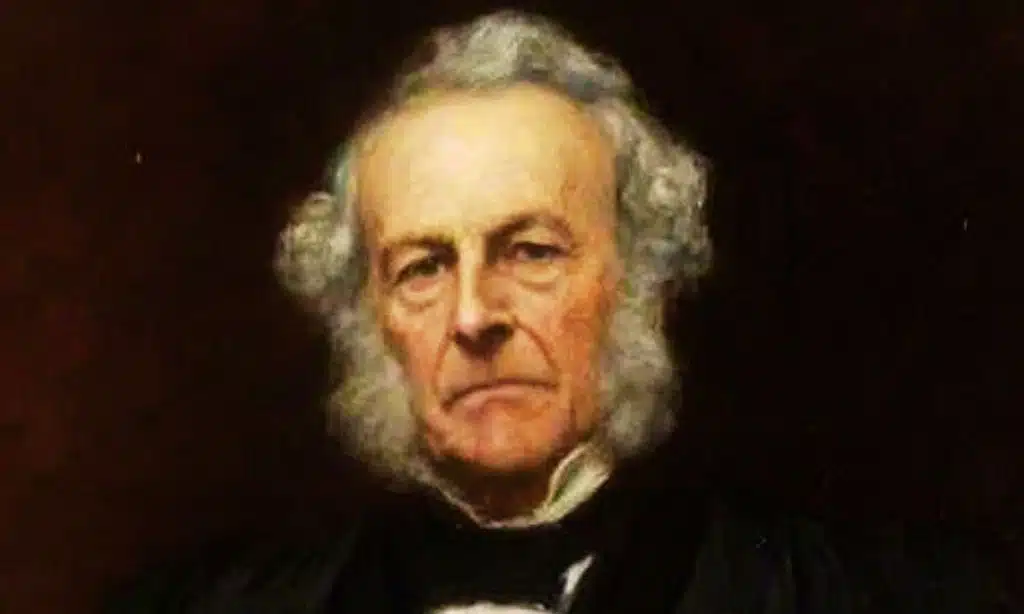August 13 is a day full of interesting events and famous birthdays throughout history. From big changes in empires to new inventions that changed the world, this date has seen it all.
In this article, we’ll look at some important things that happened on August 13 and learn about people born on this day. We’ll see how these events and people have shaped our world in different ways.
Historical Events of August 13
A. The Fall of the Aztec Empire (1521)
On August 13, 1521, something big happened in what is now Mexico. Spanish conquistadors, led by Hernán Cortés, captured Cuauhtémoc, the last Aztec Emperor. This event marked the end of the Aztec Empire.
The Spanish had come to the Americas looking for gold and new lands. They met the Aztecs, who had a big and powerful empire. Cortés and his men fought against the Aztecs for two years. They had help from other native groups who didn’t like the Aztecs.
Cuauhtémoc was brave and tried to save his people. But the Spanish had better weapons and brought diseases that made many Aztecs sick. When Cuauhtémoc was caught, it meant the Aztecs had lost.
This event changed history. It led to Spain taking control of Mexico and brought big changes to the native people’s way of life. It also started a new era of Spanish rule in the Americas.
B. Michael Servetus’ Arrest (1553)
On August 13, 1553, a man named Michael Servetus was arrested in Geneva, Switzerland. Servetus was a smart man who worked as a doctor and also thought a lot about religion.
Servetus had ideas about God that were very different from what most people believed at that time. He wrote books about his ideas, which made many people angry. The leaders of the Christian church said his ideas were wrong and dangerous.
When Servetus went to Geneva, he was recognized and arrested. The next day, he was put on trial. Later, he was found guilty of being a heretic, which means someone who goes against the main beliefs of a religion. Sadly, Servetus was burned to death because of his ideas.
This event shows how dangerous it was to have different religious ideas in the 1500s. It also led to talks about religious freedom and how people with different beliefs should be treated.
C. “Eastward Hoe” Controversy (1605)
Around August 13, 1605, a play called “Eastward Hoe” caused a big stir in London. It was written by three famous writers: Ben Jonson, George Chapman, and John Marston.
The play was shown at the Blackfriars Theatre. It was funny, but it also made fun of Scottish people. This was a problem because the new king, James I, was from Scotland.
Some people who saw the play told the king about it. He was very angry. Two of the writers, Jonson and Chapman, were sent to jail. They were worried they might have their ears cut off or even be killed!
Luckily, they were let out of jail after a short time. But this event shows how careful writers had to be about what they said in their work, especially about powerful people like the king.
D. John Smith’s Jamestown Account (1608)
On August 13, 1608, John Smith finished writing about the first days of Jamestown. Jamestown was the first lasting English settlement in America.
Smith was a leader in Jamestown. He wrote about the hard times the settlers had. They faced hunger, sickness, and fights with native people. Smith’s writing tells us a lot about how the English started living in America.
His account is very important for understanding early American history. It helps us know what life was like for the first English people who came to live in America. Smith’s stories, like his famous tale about Pocahontas saving his life, have become a big part of American folklore.
E. Richelieu’s Appointment (1624)
On August 13, 1624, Cardinal Richelieu became the Chief Minister of France. King Louis XIII gave him this important job.
Richelieu was already a powerful man in the Catholic Church. As Chief Minister, he became the second most powerful person in France, after the king. He helped make France stronger and more united.
Richelieu worked to reduce the power of noble families who sometimes caused trouble for the king. He also tried to make France more powerful in Europe. His time as Chief Minister was a big turning point in French history, helping to create the strong, centralized French state that would become very powerful in later years.
Famous Birthdays on August 13
A. William Caxton (c. 1422-1491)
William Caxton was born around 1422 in Kent, England. He became the first person to print books in English.
Caxton lived at a time when books were written by hand, which made them very expensive. He learned about printing while working in Belgium and brought this new technology back to England.
In 1476, Caxton set up England’s first printing press in Westminster. He printed many important books, including Chaucer’s “Canterbury Tales.” Caxton didn’t just print books; he also translated many works into English.
Caxton’s work helped spread reading and learning in England. He played a big role in shaping the English language we use today.
| William Caxton | |
|---|---|
| Born | c. 1422, Kent, England |
| Died | 1491, London, England |
| Known for | First to print in English |
| Major work | Printed “Histories of Troy” |
B. George Stokes (1819-1903)
George Stokes was born on August 13, 1819, in Ireland. He became a famous mathematician and physicist.
Stokes did important work in fluid dynamics, the study of how liquids and gases move. He helped create equations (called Navier-Stokes equations) that are still used today to understand things like weather patterns and how airplanes fly.
Stokes also came up with a mathematical idea called Stokes’ theorem. This helps scientists understand complex shapes and spaces.
His work has been very important in physics and math. Many of the things we use today, from weather forecasts to airplanes, rely on ideas that Stokes helped develop.
| George Stokes | |
|---|---|
| Born | August 13, 1819, Skreen, Ireland |
| Died | February 1, 1903, Cambridge, England |
| Known for | Navier-Stokes equations, Stokes’ theorem |
| Field | Physics and Mathematics |
C. Annie Oakley (1860-1926)
Annie Oakley was born on August 13, 1860, in Ohio. She became one of America’s most famous sharpshooters.
Oakley had a hard childhood and learned to hunt to help feed her family. She became very good at shooting and could hit difficult targets.
In 1885, she joined Buffalo Bill’s Wild West show. Oakley amazed crowds with her shooting skills. She could hit small targets while riding a horse or standing on her head!
Oakley became a star and toured around the world. She helped change ideas about what women could do and became an American legend.
| Annie Oakley | |
|---|---|
| Born | August 13, 1860, North Star, Ohio |
| Died | November 3, 1926, Greenville, Ohio |
| Known for | Sharpshooting skills |
| Career | Performer in Buffalo Bill’s Wild West show |
D. John Logie Baird (1888-1946)
John Logie Baird was born on August 13, 1888, in Scotland. He became known as the inventor of television.
Baird was always interested in electronics. In 1925, he made the first working television. It could show moving pictures over a distance.
In 1928, Baird made the first transatlantic television transmission from London to New York. He also worked on color TV and other improvements.
Though other inventors were also working on television, Baird’s work was very important. He helped create a technology that would change how people get information and entertainment.
| John Logie Baird | |
|---|---|
| Born | August 13, 1888, Helensburgh, Scotland |
| Died | June 14, 1946, Bexhill-on-Sea, England |
| Known for | Inventing television |
| Major achievement | First working TV system |
E. Jean Borotra (1898-1994)
Jean Borotra was born on August 13, 1898, in France. He became a famous tennis player.
Borotra was known for his energetic play and for wearing a beret on the court. He won many important tournaments, including Wimbledon in 1924 and 1926.
Borotra was part of a group called the “Four Musketeers.” These four French players dominated tennis in the 1920s and 1930s. They helped France win the Davis Cup six times in a row.
Even after he stopped playing, Borotra stayed involved in tennis. He helped organize tournaments and worked to promote the sport in France.
| Jean Borotra | |
|---|---|
| Born | August 13, 1898, Biarritz, France |
| Died | July 17, 1994, Arbonne, France |
| Known for | Tennis champion |
| Major wins | Wimbledon (1924, 1926) |
Connecting the Dots: Themes and Patterns
Looking at these events and people, we can see some interesting patterns. Many of them changed the world in big ways. Cortés changed the map of the Americas. Caxton and Baird changed how people get information. Servetus and the “Eastward Hoe” writers show us how dangerous new ideas could be in the past.
We also see that August 13 has been an important day in different areas of life. It has seen changes in politics, religion, technology, sports, and entertainment. This reminds us that history is made up of many different kinds of events and people.
These stories also show us how things that happened long ago still affect us today. The fall of the Aztecs still influences Mexico. Stokes’ math helps us understand the world around us. Oakley’s life still inspires people.
Takeaways
August 13 has been a day of big changes and important births throughout history. From the fall of empires to the rise of new technologies, this date has seen events that shaped our world. It has also been the birthday of people who made big differences in areas like printing, science, sports, and entertainment.
Learning about these events and people helps us understand how our world came to be the way it is. It shows us that history is made by all kinds of people doing all kinds of things. By looking at days like August 13, we can see how the past connects to the present and shapes our future.
References:
1. Díaz del Castillo, Bernal. (1963). The Conquest of New Spain. Penguin Books.
2. Out of the Flames: The Remarkable Story of a Fearless Scholar, a Fatal Heresy, and One of the Rarest Books in the World. (2002). Broadway Books.
3. Jonson, Ben, George Chapman, and John Marston. (1605). Eastward Hoe. Print.
4. Smith, John. (1608). A True Relation of Such Occurrences and Accidents of Noate as Hath Hapned in Virginia. London.
5. Treasure, Geoffrey. (2013). Richelieu and Mazarin. Routledge.
6. Painter, George D. (1976). William Caxton: A Quincentenary Biography of England’s First Printer. Chatto and Windus.
7. Wilson, David B. (1987). Kelvin and Stokes A Comparative Study in Victorian Physics. Adam Hilger.
8. Havighurst, Walter. (1992). Annie Oakley of the Wild West. University of Nebraska Press.
9. Burns, R.W. (2000). John Logie Baird: Television Pioneer. IET.
10. Clerici, Gianni. (1988). The Four Musketeers: The True Story of D’Artagnan, Porthos, Aramis & Athos. Parkwest Publications.






































